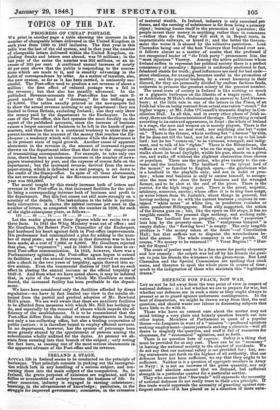TOPICS OF THE DAY.
PROGRESS OF CHEAP POSTAGE.
WE print in another page a table showing the increase in the number of chargeable letters delivered in the United Kingdom in each year from 1839 to 1847 inclusive. The first year in this table was the last of the old system, and in that year the number of chargeable letters delivered within the United Kingdom, ex- cluding franks and letters sent abroad, was 76 millions; in the last year of the series the number was 322 millions, or an in- crease of 325 per cent. A continued annual increase of nearly 40 per cent shows that the public is responding to the conces- sions which are made to it, and is steadily advancing in the habit of correspondence by leiter. As a matter of taxation, also, the new system, so far as it has been carried, is eminently suc- cessful. The Post-office used to produce a net revenue of about a million : the first effect of reduced postage was a fall in the revenue ; but that also has steadily advanced. In the published Revenue-accounts the Post-office has but once fi- gured under the head of " decrease," for the trifling sum of 8,0001. The tables usually printed in the newspapers fail to show the actual revenue accruing to any department : they are limited to Great Britain, excluding Ireland ; also they only show the money paid by the department to the Exchequer. In the case of the Post-office, this fact operates the more forcibly on the aspect of the published accounts, since the increase of business causes a larger amount of balances to be left in the hands of post- masters, and thus there is a continual tendency to abate the ap- parent increase in the account of the money that reaches the Ex- chequer ; a tendency which will continue while the department is in its present state of rapid growth. Another cause of apparent abatement in the revenue is, the amount of increased expense thrown on the department other than that due to the simple cost of transmitting correspondence. For example, to take only one item, there_has been an immense increase in the number of news- papers transmitted by post, and the expense of course falls on the department; but the increased revenue derived from the news- paper-stamp, which is defended as a real postage, is set down to the credit of the Stamp-office. In spite of all these abatements, the net revenue displayed in the Revenue-accounts for the past year was 864,000/. The moral taught by this steady increase both of letters and revenue in the Post-office is, that increased facilities for the pub- lic bring a corresponding increase both of business and profit to the department. But this fact comes out still more strongly on a scrutiny of the details. The lastrcolumn in the table is particu- larly instructive : it shows the annual increase per cent in the. number of letters, as compared with the number in 1839, for each of the eight subsequent year s, as s follows-
123 36 14 18 28 39 37 30 Let the reader glance at these figures while we recite two or three facts. In 1841 the Whig Ministry went out of office ; and Mr. Goulburn, Sir Robert Peel's Chancellor of the Exchequer, had hardened his heart against faith in Post-office improvements. His predecessor had contemplated a plan for adding to the num- ber of rural posts ; and a first step in that direction was to have been made, at a cost of 7,0001. or 8,000/. Mr. Goulburn rejected that plan, as " expensive " ; and in 1842-3 little was done to ex- tend Post-office communication. In 1843, however, there was a Parliamentary agitation ; the Post-office again began to extend its facilities; and the annual increase, which received so remark- able a check in the two years of torpidity, again thawed into ac- tive motion. Even the commercial distress of 1847 had no such effect in abating the annual increase as the official torpidity of 1842-3. And from what we have noted above, it may be inferred that, in spite of the " expense " which Mr. Goulburn so much feared, the increased facility has been profitable to the depart- ment.
We have here considered only the facilities afforded by direct regulation—we have in fact limited our view to the results ob- tained from the partial and gradual adoption of Mr. Rowland Hill's plans. We are well aware that there are auxiliary facilities to be afforded from measures with which Mr. Hill has nothing to do, and especially by the removal of abuses which impede the ef- ficiency of the establishment. It is to be remembered that the Post-office differs from the other revenue departments in being not only a tax-collecting office, but also a trading corporation of public carriers : it is therefore bound to employ efficient servants. In no department, however, has the system of patronage been more grossly abused by the appointment of persons among the subordinates wholly unfitted for the duties. At present we ab- stain from entering into that branch of the subject ; only noting the fact here, as causing one of the most serious abatements in the apparent advance of the Post-office and its revenue.






















 Previous page
Previous page